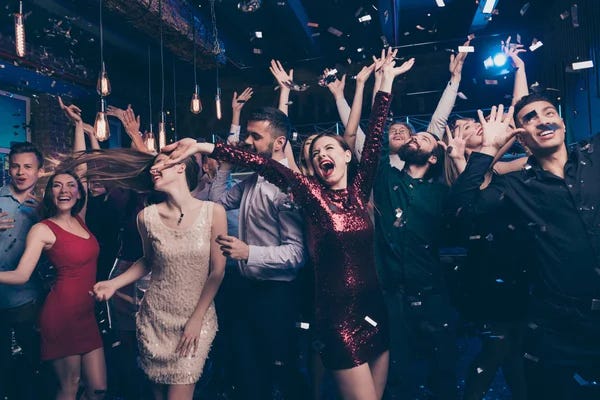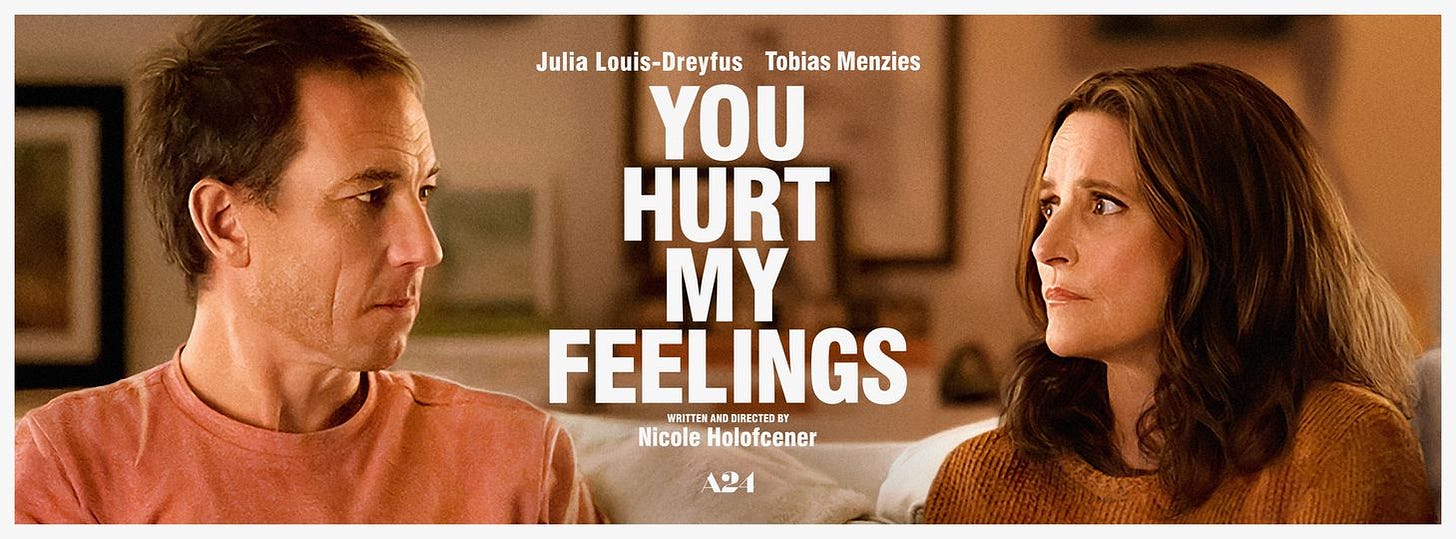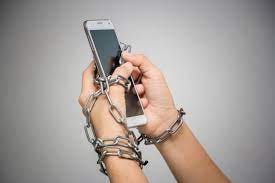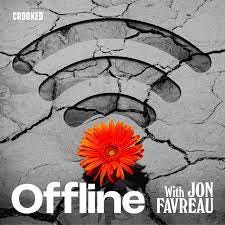The Breakup
Can a digital detox help reset our creativity?
A while ago, I was having this particular recurring dream—well, call it a nightmare, really.
I’m at a big house party somewhere, lots of dark rooms full of people I think I sort of know. Everyone’s drinking and hanging out, having fun. Gradually, I realize that these people are not neighbors or my old college friends or even my high school buddies. I recognize them, but I don’t actually know them.
Suddenly I figure out that these are all… other writers!
A few are people I’ve met briefly before, at book events or at conferences, but most are people I only know from Twitter.
I’m having a dream, I realize. I’m dreaming about being on Twitter, but in real life.
But this revelation doesn’t wake me up. I fight to stay in it, even, because something is wrong—I’ve done something embarrassing, I gather… said something that insulted someone without meaning to, or done something childish that everyone else is giggling about.
In the dream I make my way around from room to room, looking for someone I really know, attempting to figure out what I did so I can set things right, but nobody will explain.
And that’s when I wake up in a cold sweat.
When I told my therapist about this, he just stared at me as I finished, and finally said, “Kris, I think you’re smart enough to figure out what your brain is trying to tell you.”
I replied that I thought a third grader would probably be smart enough to figure that out, and he laughed.
“Even my subconscious’s creativity isn’t doing so hot,” I joked.
We’d talked already about my feeling of being a bit uninspired, a little rusty, as I moved through a summer of intense editing and nonfiction work, while wanting badly to finally begin working on some new fiction again. I’d expected that it would take a little work to get back into the creative flow, but was frustrated at just how dry my imagination wells seemed to be running.
My therapist recommended taking a break—some time to just have some fun and not think about writing at all… why not take a few hours off and see a movie in the middle of the day?
I agreed, and immediately went out to see You Hurt My Feelings, which is about a writer who gets upset with her spouse and most everyone in her life, for telling her they like her work when they really don’t. It was… not really relaxing.
My therapist suggested I try again.
As I thought back on the Twitter nightmares, I considered that even at the lowest points of my school days, I had never had stress dreams like this one. I’d never had the other cliched dreams, like showing up to school naked or having to take a test no one had warned me about. And so I considered that I had somehow put myself in a uniquely stressful mental environment, at age forty-one—topping even middle school.
Middle school.
“I think I also need to get off my phone so much,” I said to my therapist.
“Yeah,” he agreed. “That’s probably a really good idea.”
So I tried. Earlier this summer I stopped using Twitter as much as I used to—which was helped along by Elon Musk having already ruined much of what I’d once enjoyed about it. I logged off of the app on my phone’s browser, and found that having to manually sign in again did usually give me a chance to stop myself before I used it again. I still went back and forth, but my time on the platform did go way, way down.
And I haven’t had that particular dream since then. Mission accomplished?
Not exactly.
Because I noticed that my overall phone use did not go down. I ended up just turning to Instagram instead. I thought that moving over to the more visual and upbeat platform would be a big improvement—posts have less focus on news events, there’s less arguing, less Elon, less Trump, less altogether.
Plus, a much higher percentage of the people I follow on Instagram really are people I know—neighbors, friends, and yes, a lot of other writers, but they tend to be people I’ve met and spoken to in real life at least a few times, and many that I know much better than that. I often have really fruitful and inspiring conversations through Instagram with people who genuinely interest me, and who are caring and kind. It is everything that Twitter isn’t. I find the whole experience a lot more pleasant, much more playful, and even—fun.
So what’s the trouble?
It comes back to my remark to my therapist about my subconscious resorting to cliché. I’ve been aware for a while now that I use my phone impulsively at times I don’t want to, or simply shouldn’t—no one ever needs to see someone’s Story enough that they should be skimming through it at a red light, we can probably agree on that. And I’m not winning Father of the Year when I’m telling my son he can’t be on YouTube all the time and then skimming through my Feed while he’s trying to talk to me about what happened at camp that day. That's not going to end well.
Still. What about when I’m alone and not supposed to be focused on anything or anyone else? No harm in taking a quick hit of someone else’s vacation photos or galley brags then, right?
Except that’s exactly when my creative mind ought to be coming to life, only I’m not letting it. By filling those rare down moments with Content™ all the time, I’m restricting my imagination from roaming more freely.
And sometimes this is intentional, as when my imagination is mostly sending me heaps of baseless anxiety, rather than anything poignant to write about… but then I also notice that my anxiety-level remains high, even after browsing relatively pleasant photos… why? I’m not arguing with Trump voters anymore, or joining a mass-panic post-a-thon about whatever the Twitter topic of the day seems to be. (As I write this now these are… 1) Bradley Cooper’s prosthetic nose and 2) are sex scenes important?) My brain still seems to behave as if I’m still pouring vitriol all over it.
Listening to a podcast called Offline the other day, I heard the two hosts discussing an ongoing challenge they were doing to try and reset their phone habits. They were using timed lockboxes, comically oversized phone cases, grayscale modes, and even trading in smartphones for flip phones in order to try and break their addictions.
These guys were logging 4-6 hours a day on their screens, mostly browsing TikTok and Slack and Twitter—so at first I considered their issues to be in another realm from mine.
But as they talked about their symptoms (browsing during bedtime stories, waking up early to be online before others wake up, and checking Twitter while jogging/driving) I realized it was still very similar to my experience, only turned up a few notches.
Both hosts expressed a deep desire to be able to return to old hobbies like reading books or playing music, and feeling as if they had no ability to focus on these things because their phones had destroyed their ability to pay attention.
I’ve noticed my own reading habits improving again, after getting off Twitter, but I’d like to read even more, and with less distractibility. Fortunately, I’m quite capable of tuning out my phone for hours at a time when I’m absorbed in writing—so I count myself lucky in that. I do still notice a drop in my overall ability to focus, but this isn’t my main concern.
It’s that quiet thinking time, when I’m not reading or writing, that I don’t get enough of anymore, and without it I find that my creativity overall struggles.
I’ve begun going on long walks in the woods, which I really enjoy, because I can’t look at my phone or listen to podcasts without tripping over everything—but doing that once a month, and taking a shower every day, might be my only two distraction-free activities at this point.
How did it get this way? I decided to think back on the story, as a creative exercise. I was a very early user of the internet, thanks to my parents who both worked in computers. By 1992 or 1993 I was spending some time every day posting on Prodigy bulletin boards to discuss my favorite fantasy novels with other fans, using a dial-up modem that did not yet have its own dedicated line, which meant that I couldn’t sit on it long without blocking phone calls. We had one PC to share, and it was out in the living room where anyone could see what I was doing on it at any time.
I remember getting my first cell phone when I went to college—Fall of 1999—a revelation that saved me from relying on pay phones and using 10-10-321 when I wanted to call long distance. I used AIM, or AOL Instant Messager, to chat after school with friends. It’s hard to think back on the days when, riding around with my friends in their cars in high school, I was truly unreachable, and truly undistracted by anything in my pocket.
In college I used my cell phone more and more, but text messages still cost money—friends would sometimes get very mad at you for texting them, and I remember a few arguments over a slew of .35 cent charges. So primarily people emailed each other, or called one another on the landline phones we still had in our apartments and dorms.
I got my first “smart” phone, a Palm Treo, twenty years ago, when I moved to New York City, because I fantasized that I might soon need to get emails from agents and publishers while I was away from my apartment. This proved to be a bit optimistic, but back then the phone didn’t really distract me either. I usually wouldn’t even take it out while I was walking to class because I was worried someone would try and steal it. It didn't play music or have a usable web browser.
My walks to and from campus were typically times when I’d zone out and think about my stories. On long solo car rides on the weekends down to Baltimore to see my girlfriend, I usually spent the hours talking out loud to myself about my latest sputtering story, trying to work out what might happen next.
It helped that social media didn't exist yet. Facebook was only just being made up in Cambridge by Mark Zuckerberg, but even then, for the first several years you could only join if you had a .edu email address from a handful of elite schools. I had one of these (two of these really) but even so, Facebook back then was more like a MySpace page—there was no “feed” and you had to deliberately hop around to friend’s pages to see what they’d posted. Most people had few, or no photos up at all, because phones had generally very poor quality cameras. The iPhone was still a few years away—I remember when a friend of mine first spotted someone using one in a bar, he took a photo of the other person (using a digital camera of course) and almost got beaten up.
In 2009 and 2010, while writing my first novel, I was much more likely to be distracted by a binge-watch of The Sopranos or ER or The West Wing than by anything on my phone. (Notable though that I still had some compulsive tendencies to distract myself.) I used to walk to the Blockbuster every day and rent another set of DVDs and go back to watch them in my apartment.
Still, today, I look back on those years, when I did my first Forty Stories project, as a kind of golden age of creativity—I was writing weird new stuff every week, and yes, posting it online, but with only a very limited ability to share it with anyone other than close friends, who I still communicated with mainly on email. (These were also days before I had kids, but I was also teaching many more classes, and working part time for my parents’ tech company, so there were plenty of other things on my plate.)
It was only as my first novel was coming out in 2013, a publicist friend advised me to get on Twitter and to set up an Author Page on Facebook, so I could interact with readers and potential readers. I did, and I loved it. I had a Tumblr as well, and every day I’d ping ping between these, connecting with tons of cool people: booksellers, librarians, other writers, other professors, and it certainly felt like I was doing something to help my book sales along… but I definitely felt “hooked” by this point. I checked in a hundred times a day, and immediately react to anyone posting about my book, imagining each time that this was incredibly important.
Who knows, maybe at first it was… but since then it has been a steady diminishing of returns though over the subsequent decade. Partially this is just because I’ve never really used the platforms very well. I never did the sort of things you need to do in order to get thousands of followers, having been raised in an age where it was still seen as very unseemly to be actively promoting your work to others. (One former professor of mine literally chewed me out over it at one point, because he thought it was not the way authors ought to behave.)
Then, during the 2016 election cycle and afterwards it became more of a way to keep myself in a constant panic about politics. There were times when I was sure I was just a tweet or two away from proving Trump was a Russian asset. I imagined I was somehow doing some good by squabbling with Jill Stein and Trump voters. I'm sure I didn't do any good and that it very nearly cost me a lot of real friendships with people I've known my whole life. Thankfully forgiveness still exists, at least offline.
I really only ever wanted to use it as a way to meet new and interesting people, and to form a kind of community with other writers and readers. And back when it was that, I really did enjoy it… all nightmares aside.
But by now that party feels like it has ended, largely. To the extent it continues, I’d like to stay active in it—the issue I have isn’t with these platforms really, or anyone on them, so much as it is with my own addicted and habitual use of them.
I don’t mean to minimize real drug and alcohol addiction here, but just personally, the feeling does reminds me a lot of the points in my life where I’ve cut back dramatically on things like drinking because I could tell they were messing with my moods and thinking, and impacting my writing life (among other things).
Studies show that using a phone gives your brain a dopamine rush, and that we can experience a kind of withdrawal when we aren't getting it regularly. This is where that distraction, anxiety, and irritability come in. But what about creativity?
A study published in the journal Social Cognitive and Affective Neuroscience found that subjects did worse on creative tasks after high smartphone use. People who scored high on a test measuring Smartphone Addiction had a notable drop in “fluency, flexibility, and originality.” Using neuroimaging, they found that “prefrontal cortex and temporal areas were not as active” while performing creative tasks. They also found that it potentially inhibited access to memories, an important source of inspiration. (Perhaps we even use smartphones to “escape” past trauma? I'm fascinated by this possibility… our own little pocket-sized Eternal Sunshine?)
When I look at the whole story like this, it seems clearer to me how it all got out of hand, and what sort of balance I'd like to restore now. Call it a midlife crisis, but this feels like the time to make a change. As I head into a new school year, a new set of writing projects, a second decade of parenting, and the next fifteen years of my marriage, I'd very much like there to be much less of my phone in the picture.
So here I am… ironically typing this out right now on my phone… but I picked up a book called How to Breakup With Your Phone which has a 30-Day plan designed to help end a smartphone addiction. It isn't about ditching the device entirely, but figuring out how to set healthier boundaries and make it back into something I use that does not use me in return. My big hope is that in doing this, I'll find some fresh creative juices beginning to flow as well… I'm excited to find out.
One of the author’s suggestions is to get a friend to do the Breakup with me, and so I asked my pal Neil Bardhan if he wanted to join the fun—he’s a writer and a comedian, who I know is always up for some lifehacking.
Today, I'm going on a vacation. And then over the next month Neil and I are going to try and follow the guide and see what helps and what doesn’t. My plan is to keep daily track of any progress, particularly when it comes to any impact on my creativity, and then report back here to you all in my next newsletter post, around the end of September.
If anyone else is interested in playing along, feel free to reach out… but maybe over email, not Twitter.
Wish us luck!













